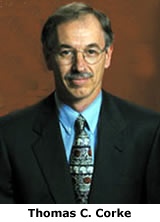
Thomas C. Corke, the Clark Equipment Professor of Aerospace and Mechanical Engineering at the University of Notre Dame, has been named a fellow of the American Physical Society.
The APS Fellowship Program was created to recognize members who have made advances in knowledge through original research and publication or significant and innovative contributions in the application of physics to science and technology, or to the teaching of physics, or who have provided service and participated in the activities of the APS. Each year, no more than half of 1 percent of the membership of the society is recognized by APS peers for election to the status of fellow.
Corke is being honored for hisexperiments elucidating the structure of turbulent boundary layers, the transition from laminar to turbulent flow in boundary layers and in unconfirmed systems and the control of turbulence.
The founding director of Notre Dames Center for Flow Physics and Control and director of the Hessert Laboratory for Aerospace Research, Corke specializes in the study of fluid mechanics. He earned his bachelors, masters and doctoral degrees, all in mechanical and aerospace engineering, from the Illinois Institute of Technology (IIT). He joined the IIT faculty after completing his doctorate in 1981 and reached the rank of full professor there before coming to Notre Dame in 1999.
In addition to his most recent honor, Corke is a fellow of the American Society of Mechanical Engineers and an associate fellow of the American Institute of Aeronautics and Astronautics. His research on plasmas has led to a new type of plasma senor designed for use in hypersonic Mach number, high enthalpy flows. He also is the author ofDesign of Aircraft,which has been adopted as the capstone design text in 12 aerospace departments across the country, and several inItaly,FinlandandCanada.
Corkes research interests are in the area of fluid mechanics, specifically related to hydrodynamic stability, transition of laminar flow to turbulent flow, aeroacoustics computational fluid dynamics, applied turbulence control, unsteady flows, wind engineering and atmospheric diffusion, and wind tunnel design.
Founded in 1899, the APS is the worlds largest professional body of physicists, representing more than 45,000 physicists around the world.
TopicID: 19943